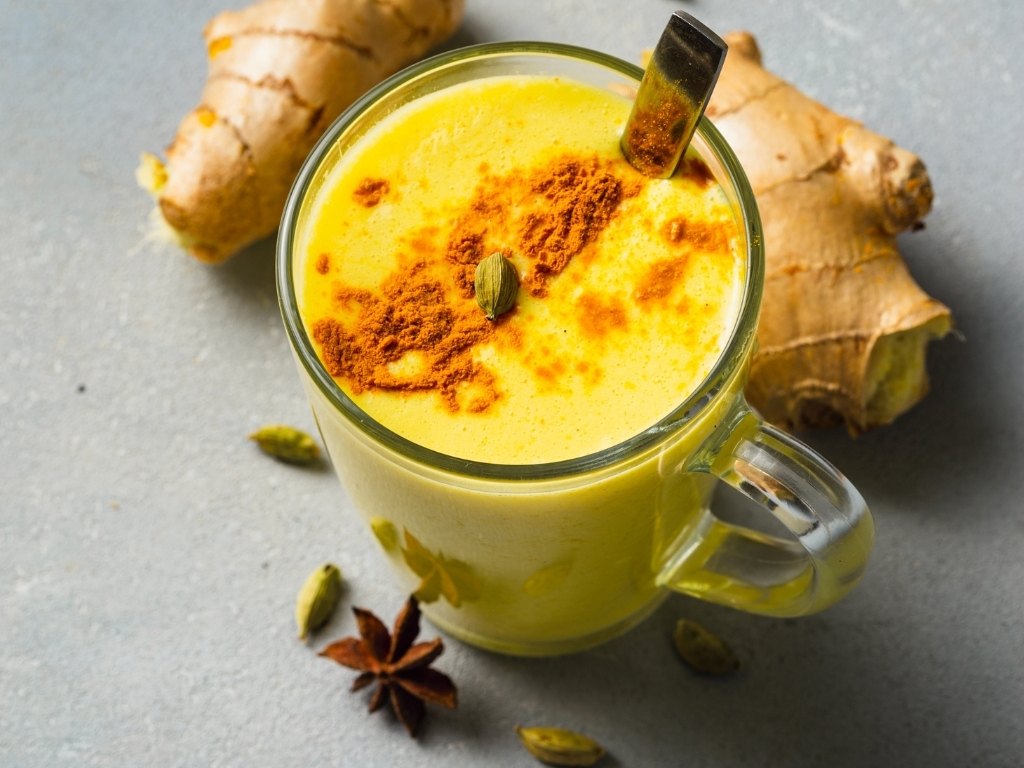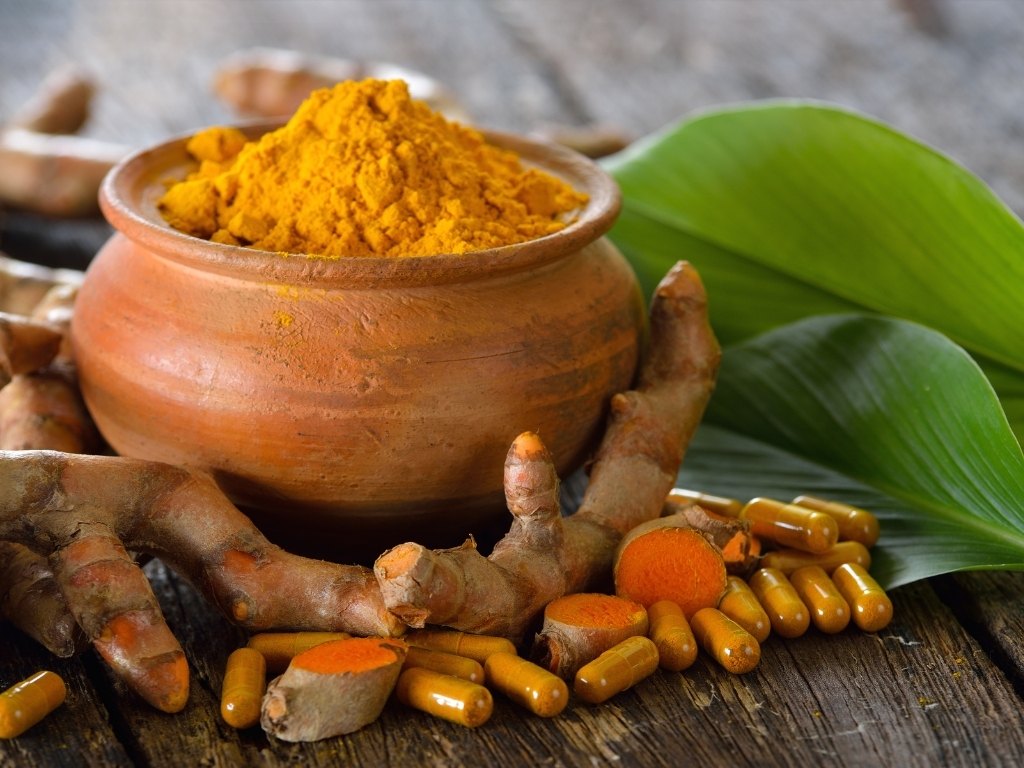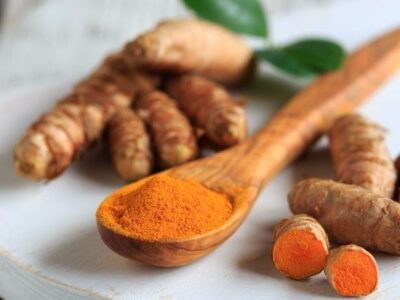Last Updated on September 16, 2022 by Rebecca Huff
The health benefits of turmeric will inspire you to add it to as many recipes as possible. South Asian and Middle Eastern cultures long included turmeric in recipes and as medicine.
What secrets does it hold in simple cooking, dishes, and traditional medicine that could benefit you?
The highly active ingredient in turmeric is curcumin, which gives the root its yellowish color. Turmerone is another less understood active ingredient. Studies suggest it may be useful for stroke patients and dementia cell to potentially support the recovery of brain function.
The curcuminoids in turmeric contain potent anti-inflammatories and powerful antioxidant properties which is likely the number one health benefit. Researchers show curcumin reduces oxidative stress which is an underlying factor in many serious diseases, including heart disease and type 2 diabetes.
Turmeric has gained popularity as a dietary supplement.
Health Benefits of Turmeric for Mind and Body Wellness
- May ease depression making it a natural antidepressant
- Boosts the immune system
- Protects the damage caused by free radicals
- May delay onset of type 2 diabetes
- Reduces the risk of heart disease
- Anti-inflammatory Properties particularly as associated with obesity
- Can help PMS
- Ease joint pain and symptoms of osteoarthritis
- Turmeric is being studied as a treatment for Crohn's and ulcerative colitis
- Clinical trials showed 90 mg curcumin supplement taken twice a day for 18 months helped improve memory performance in adults without dementia.
- May help glaucoma and cataract patients
- Animal studies have explored the effects of turmeric on tumors and found that it can reduce the spread of cancer
- Lowered cholesterol and blood pressure
Potential Side Effects
Average turmeric dosage is between 150-250 mg of curcumin per day. According to medicine.net high doses of turmeric could cause stomach upset, nausea, dizziness, or diarrhea.
People who should not take turmeric include those with gallbladder problems, bleeding disorders, diabetes, gastroesophageal reflux disease (GERD), infertility, iron deficiency, liver disease, hormone-sensitive conditions and arrhythmia. Pregnant women and those who are going to undergo surgery should not use turmeric.
Medicine.net
Before making any major dietary changes or taking supplements, you should seek medical advice to avoid risk to your health. Speak with a dietitian familiar with your unique health conditions to see if adding turmeric to your diet should be part of your healthcare plan.
Magnify Benefits by Adding Black Pepper
Black pepper is said to increase the bioavailability of curcumin. Therefore, combining turmeric with black pepper can magnify benefits, particularly those using it to ease the pain of arthritis. For those with chronic inflammation, it can be a powerful combination.
Black pepper (piperine) enhances curcumin absorption in the body by up to 2,000%.
Can turmeric be taken with milk?
One popular way to take turmeric is in a drink called “Golden Milk.” Turmeric is added to warm milk with honey or other sweeteners to create a luscious golden health beverage.

Turmeric for Depression
Curcumin has shown to be promising in animal trials for depression. “Although the antidepressant effect of curcumin is not fully understood, it is hypothesized to act through inhibiting the monoamine oxidase enzyme and modulating the release of serotonin and dopamine.”
If you have depression, the protein known as brain-derived neurotrophic factor (BDNF) is reduced and your hippocampus, which helps with learning and memory, starts to shrink. The use of curcumin in clinics for the treatment of major depression is limited due to its poor gastrointestinal absorption. (1)
Turmeric for Weight Loss
In studies of 1,604 people, Curcumin intake significantly reduced body mass index. Total daily dose of curcumin intake or curcumin consumption varied between 70 and 2,400 mg/day. The duration of treatment among studies was between 4 and 36 weeks. (3)
How I was introduced to Turmeric
The children, some friends and I enjoyed India Fest here in Knoxville, Tennessee over the weekend. I find it exhilarating to explore other cultures.
We enjoyed tasting all the wonderful foods from the Indian culture. The kids participated in the dances. Everyone enjoyed listening to the music and meeting new people.
One spice we learned more about was Turmeric. We tasted many dishes which contained this bright yellow root. I have been using Turmeric in preparing dishes for several years. Golden Latte's are also in my warm drink rotation.
My husband takes a Turmeric supplement to reduce aches and pains from working too much.

Turmeric comes from the root of the Curcuma longa plant and has a tough brown skin and a deep orange flesh. The Chinese and Indian medicinal systems have been using Turmeric as a powerful anti-inflammatory for thousands of years.
If you've ever eaten yellow mustard you have Turmeric to thank for the bright yellow color. In flavor, it has a peppery, warm and bitter flavor and a mild fragrance slightly reminiscent of orange and ginger.
Turmeric is an excellent source of manganese, iron, B6, fiber, copper and potassium. In addition to being anti-inflammatory agent it is used to treat a large variety of conditions:
- flatulence
- jaundice
- menstrual difficulties
- bloody urine
- hemorrhage
- toothache
- bruises
- chest pain
- colic
Turmeric Testimonials
One trainer at my gym keeps her Rheumatoid Arthritis in remission simply by taking Turmeric (in capsules). Due to the antioxidant curcumin in Turmeric it is able to neutralize free radicals, (chemicals that can travel through the body and cause great amounts of damage to healthy cells and cell membranes.)
Not only does this help Rheumatoid Arthritis, it also helps in diseases where free radicals are responsible for the painful joint inflammation and eventual damage to the joints. Turmeric's combination of antioxidant and anti-inflammatory effects explains why many people with joint disease find relief when they use the spice regularly.
Another friend of mine relieved her IBD (Inflammatory Bowel Disorder) by taking Turmeric. Curcumin may provide an inexpensive, well-tolerated, and effective treatment inflammatory bowel diseases such as Crohn's and ulcerative colitis.
Recent studies show that Curcumin's antioxidant actions enable it to protect the colon cells from free radicals that can damage cellular DNA. Because of their frequent replication, mutations in the DNA of colon cells can result in the formation of cancerous cells much more quickly.
Curcumin also helps the body to destroy mutated cancer cells, so they cannot spread through the body and cause more harm. A primary way in which curcumin does so is by enhancing liver function as well as by inhibiting the synthesis of a protein thought to be instrumental in tumor formation and preventing the development of additional blood supply necessary for cancer cell growth.
Benefits of turmeric (cucumin) also include preventing the oxidation of cholesterol in the body helping to protect the cardiovascular system. Because it crosses the blood brain barrier, it is also thought to protect against the ravages of Alzheimer's Disease.
HOW TO ADD TURMERIC TO YOUR DIET:
- Add to any egg dish to create a brighter yellow color, including scrambled eggs, omelets, deviled eggs, egg salad, and quiche.
- Delicious Turmeric Ginger Refresher – Inflammation Blaster
- Goes great in most bean and lentil dishes, just start with a little and work your way up.
- Make a traditional curry dish
- Turmeric can be used in salad dressings to give them a beautiful golden yellow color
- Sprinkle some Turmeric on roasted potatoes or corn on the cob
- Drink it in a juice: Kickstart Your Health Journey with these 7 Wellness Shots
- Turmeric tastes great with cauliflower and onion plus this combination actually works together to help prevent colon and prostate cancer
- Sprinkle turmeric and lemon juice over chicken breasts and bake in the oven, delicious
- Or use in this recipe for authentic chicken curry
For the most curcumin content, choose turmeric over curry powder—a study analyzing curcumin content in 28 spice products described as turmeric or curry powders found that pure turmeric powder had the highest concentration of curcumin.
Most studies cited use standardized turmeric extracts which contain large amounts of curcumin.
Sources
- S.K. Kulkarni, Ashish Dhir, Kiran Kumar Akula, “Potentials of Curcumin as an Antidepressant”, The Scientific World Journal, vol. 9, Article ID 624894, 9 pages, 2009. https://doi.org/10.1100/tsw.2009.137
- Influence of piperine on the pharmacokinetics of curcumin in animals and human volunteers, Shoba G, Joy D, Joseph T, Majeed M, Rajendran R, Srinivas PS Planta Med. 1998 May
- Akbari, Maryam et al. “The Effects of Curcumin on Weight Loss Among Patients With Metabolic Syndrome and Related Disorders: A Systematic Review and Meta-Analysis of Randomized Controlled Trials.” Frontiers in pharmacology vol. 10 649. 12 Jun. 2019, doi:10.3389/fphar.2019.00649
- Davis, B.M., Pahlitzsch, M., Guo, L. et al. Topical Curcumin Nanocarriers are Neuroprotective in Eye Disease. Sci Rep 8, 11066 (2018). https://doi.org/10.1038/s41598-018-29393-8



 Create a Bedroom Oasis for Better Sleep
Create a Bedroom Oasis for Better Sleep
Leave a Reply
You must be logged in to post a comment.